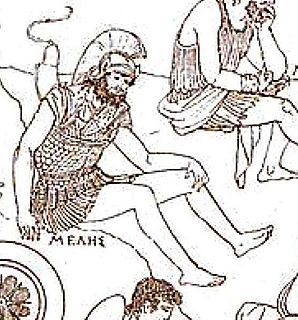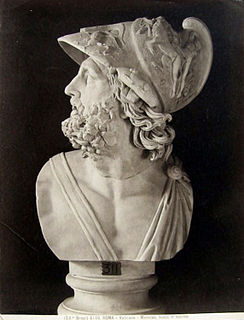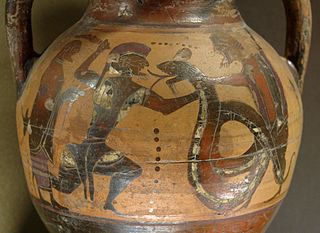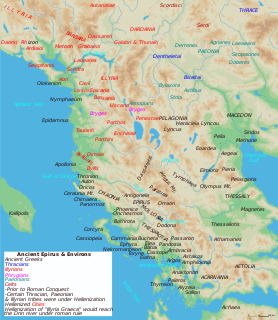 W
WIn Greek mythology, Acamas or Akamas was a character in the Trojan War.
 W
WIn Greek mythology, Achilles or Achilleus was a hero of the Trojan War, the greatest of all the Greek warriors, and is the central character of Homer's Iliad. He was the son of the Nereid Thetis and Peleus, king of Phthia.
 W
WThe relationship between Achilles and Patroclus is a key element of the stories associated with the Trojan War. Its exact nature has been a subject of dispute in both the Classical period and modern times. In the Iliad, Homer describes a deep and meaningful relationship between Achilles and Patroclus, where Achilles is tender toward Patroclus but callous and arrogant toward others. Homer never explicitly casts the two as lovers, but they were depicted as lovers in the archaic and classical periods of Greek literature, particularly in the works of Aeschylus, Aeschines and Plato.
 W
WIn Greek mythology, Agamemnon was a king of Mycenae, the son, or grandson, of King Atreus and Queen Aerope, the brother of Menelaus, the husband of Clytemnestra and the father of Iphigenia, Electra or Laodike (Λαοδίκη), Orestes and Chrysothemis. Legends make him the king of Mycenae or Argos, thought to be different names for the same area. When Menelaus's wife, Helen, was taken to Troy by Paris, Agamemnon commanded the united Greek armed forces in the ensuing Trojan War.
 W
WAjax or Aias is a Greek mythological hero, the son of King Telamon and Periboea, and the half-brother of Teucer. He plays an important role, and is portrayed as a towering figure and a warrior of great courage in Homer's Iliad and in the Epic Cycle, a series of epic poems about the Trojan War. He is also referred to as "Telamonian Ajax", "Greater Ajax", or "Ajax the Great", which distinguishes him from Ajax, son of Oileus, also known as Ajax the Lesser. His name means "of the earth".
 W
WAjax was a Greek mythological hero, son of Oileus, the king of Locris. He was called the "lesser" or "Locrian" Ajax, to distinguish him from Ajax the Great, son of Telamon. He was the leader of the Locrian contingent during the Trojan War. He is a significant figure in Homer's Iliad and is also mentioned in the Odyssey, in Virgil's Aeneid and in Euripides' The Trojan Women. In Etruscan legend, he was known as Aivas Vilates.
 W
WIn Greek mythology, Antilochus was a prince of Pylos and one of the Achaeans in the Trojan War.
 W
WIn Greek mythology, Automedon, son of Diores, was Achilles' charioteer.
 W
WCalchas is an Argive mantis, or "seer," dated to the Age of Legend, which is an aspect of Greek mythology. Calchas appears in the opening scenes of the Iliad, which is believed to have been based on a war conducted by the Achaeans against the powerful city of Troy in the Late Bronze Age.
 W
WDiomedes or Diomede is a hero in Greek mythology, known for his participation in the Trojan War.
 W
WEpeius or Epeus was a mythological Greek soldier during the Trojan War or, in some accounts, one of the Achaean Leaders, at the head of a contingent of 30 ships from the islands of the Cyclades. He was also the architect of the Wooden Horse, by means of which the Achaeans took Troy; he was himself among those warriors who hid inside it.
 W
WIn Greek mythology, Idomeneus was a Cretan king and commander who led the Cretan armies to the Trojan War. He was also one of the suitors of Helen, as well as a comrade of the Telamonian Ajax. Meriones was his charioteer and brother-in-arms.
 W
WIn Greek mythology, Machaon was a son of Asclepius; and the older brother of Podalirius. He and his brother led an army from Tricca in the Trojan War on the side of the Greeks.
 W
WIn Greek mythology, Mégês Phyleïdês was the commander of Epeans and/or Dulichians during the Trojan War.
 W
WIn Greek mythology, Menelaus was a king of Mycenaean (pre-Dorian) Sparta. According to the Iliad, Menelaus was a central figure in the Trojan War, leading the Spartan contingent of the Greek army, under his elder brother Agamemnon, king of Mycenae. Prominent in both the Iliad and Odyssey, Menelaus was also popular in Greek vase painting and Greek tragedy, the latter more as a hero of the Trojan War than as a member of the doomed House of Atreus.
 W
WIn Greek mythology, Meriones was a son of Molus and Melphis or Euippe. Molus was a half-brother of Idomeneus. Like other heroes of mythology, Meriones was said to be a descendant of gods. As a grandson of Deucalion, Meriones's ancestors include Zeus, Europa, Helios, and Pasiphae, the sister of Circe. Meriones possessed the helmet of Amyntor, which Autolycus had stolen. He inherited the helmet from his father Molus and later gave it to Odysseus. Meriones killed seven men at Troy.
 W
WNeoptolemus, also called Pyrrhus, was the son of the warrior Achilles and the princess Deidamia, and brother of Oneiros in Greek mythology, and also the mythical progenitor of the ruling dynasty of the Molossians of ancient Epirus.
 W
WNestor of Gerenia was the legendary wise King of Pylos described in Homer's Odyssey. Excavations from 1939 revealed his palace, and excavations have recently resumed at the site.
 W
WOdysseus, also known by the Latin variant Ulysses, is a legendary Greek king of Ithaca and the hero of Homer's epic poem the Odyssey. Odysseus also plays a key role in Homer's Iliad and other works in that same epic cycle.
 W
WPalamedes was a Euboean prince as the son of King Nauplius in Greek mythology.
 W
WIn Greek mythology, as recorded in Homer's Iliad, Patroclus was a childhood friend, close wartime companion, and the presumed lover of Achilles.
 W
WPhiloctetes, or Philocthetes, according to Greek mythology, was the son of Poeas, king of Meliboea in Thessaly, and Demonassa or Methone. He was a Greek hero, famed as an archer, and a participant in the Trojan War.
 W
WIn Greek mythology, Phoenix was the son of king Amyntor. Because of a dispute with his father, Phoenix fled to Phytia, where he became king of the Dolopians, and tutor of the young Achilles, whom he accompanied to the Trojan War. After Achilles had in anger withdrawn from the war, Phoenix tried to persuade Achilles to return.
 W
WIn Greek mythology, Podalirius or Podaleirius or Podaleirios was a son of Asclepius.
 W
WIn Greek mythology, Protesilaus was a hero in the Iliad who was venerated at cult sites in Thessaly and Thrace. Protesilaus was the son of Iphiclus, a "lord of many sheep"; as grandson of the eponymous Phylacos, he was the leader of the Phylaceans. Hyginus surmised that he was originally known as Iolaus—not to be confused with Iolaus, the nephew of Heracles—but was referred to as "Protesilaus" after being the first to leap ashore at Troy, and thus the first to die in the war.
 W
WIn Greek mythology, Sthenelus was one of the Achaean Leaders. He was also counted as one of the Epigoni and a suitor of Helen.
 W
WIn Greek mythology, Teucer, also Teucrus, Teucros or Teucris, was the son of King Telamon of Salamis Island and his second wife Hesione, daughter of King Laomedon of Troy. He fought alongside his half-brother, Ajax, in the Trojan War and is the legendary founder of the city of Salamis on Cyprus. Through his mother, Teucer was the nephew of King Priam of Troy and the cousin of Hector and Paris—all of whom he fought against in the Trojan War.